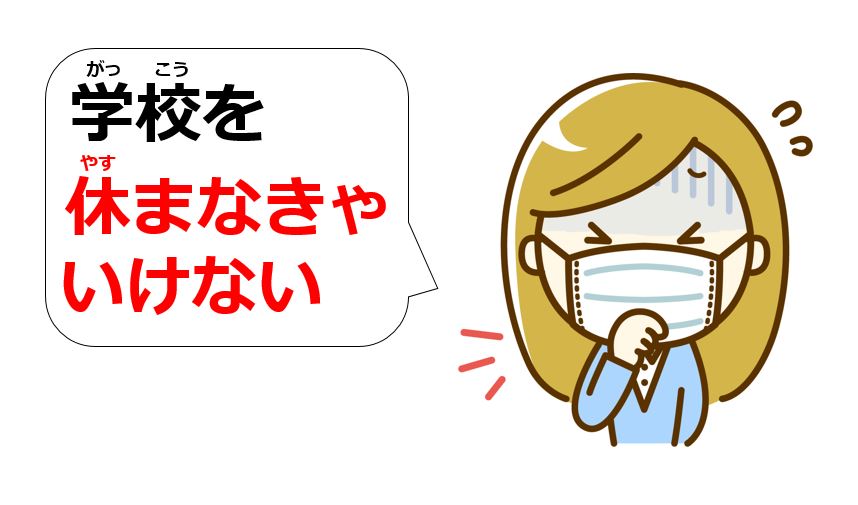Last time, you learned how to make commands and requests, e.g. “もっと勉強しろ (Study more),” “もっと勉強してくれませんか (Could you please study more)?” Then, if you would like to say, “you have to study more,” what should you do? In this lesson, you will learn how to express obligation and prohibition.
Explanation for How to Express Prohibition and Obligation
| Table of Contents Prohibition: …ては + だめだ・いけない・ならない Obligation: なければ + だめだ・いけない・ならない Alternative Sentence Patterns |
Obligation means “what you must do” while prohibition means “what you must not do.” They are generally determined by law, contracts, customs, common sense, etc. In English, you can express them by placing a key phrase such as “must” or ”have to” before a verb. In Japanese, you express obligation and prohibition by conjugating verbs.
Basic Idea of だめだ, いけない, and ならない
ボブはもっと 勉強しなければ | だめだ
ボブはもっと 勉強しなければ | いけない
ボブはもっと 勉強しなければ | ならない
All of the examples above mean “Bob must study more.” The difference is the formality, i.e. だめだ is casual and mostly used in conversation, いけない is neutral, and ならない is formal and used in writing. As you can see, we have divided the conditional verb part, i.e. 勉強しなければ from the second part in bold. You can also replace the conditional verb with several words in order to express different formality. You will learn the words one by one here. First of all, please memorize the concept of the three words: だめだ, いけない, and ならない (*You will learn Japanese conditionals in detail in other lessons).
Prohibition: …ては + だめだ・いけない・ならない
| [あなたは] | 人の物を | 盗っては(いけない / いけません) |
| [Topic / Subject] | Direct Object | Verb: Prohibition |
| [You] must not steal other people’s things. | ||
The conjugation is simple. You can utilize the te-form and attach は. Then, you choose one of the three words depending on the context. If you use sentence-ending particles, your speech will sound softer.
| ここで騒いではだめ(だ / です)よ。 [You] must not make noise here. |
| 電車で携帯電話を使っては(いけない / いけません)。 [You] must not use a cellphone on the train. |
| 海で花火をしては(ならない / なりません)。 [You] must not play with fireworks at the beach. |
The above sentences sound formal even if you use だめだ. If you would like to be more casual, you can replace では with じゃ and ては with ちゃ. In this context, ならない is not suitable.
| ここで騒いじゃだめ(だ / です)よ。 |
| 電車で携帯電話を使っちゃ(いけない / いけません)。 |
Obligation: なければ + だめだ・いけない・ならない
| [あなたは] | ルールを | 守らなければ(ならない / なりません) |
| [Topic / Subject] | Direct Object | Verb: Obligation |
| [You] have to keep the rule. | ||
The conjugation is also simple. You can utilize the negative form. You just replace ない (of the negative form) with なければ. Just like the above, by using sentence-ending particles, you can make your speech softer.
| 漢字をもっと練習しなければだめ(だ / です)。 [I] must practice kanji more. |
| 病院に行かなければ(いけない / いけません)よ。 [You] have to go to the hospital. |
| 大人は働かなければ(ならない / なりません)。 Adults must work. |
なければ actually sounds really formal and is rarely used in conversation. By replacing なければ with なきゃ, you can make your speech more suitable for conversation. In this context, だめだ or いけない should be used.
| 漢字をもっと練習しなきゃだめ(だ / です)。 |
| 病院に行かなきゃ(いけない / いけません)よ。 |
If you would like to more casual, you can drop the part after なきゃ.
| 漢字をもっと練習しなきゃ。 |
| 病院に行かなきゃ。 |
[adsense]
Alternative Sentence Patterns
| Casual | Neutral | Formal |
|---|---|---|
| なきゃ なくちゃ – |
– – ないと |
なければ なくては – |
You know one sentence pattern when it comes to expressing obligation, however, there are still two other patterns. The meanings are almost the same. Thus, please pay attention to the formality.
なくては / なくちゃ + だめだ・いけない・ならない
| 宿題をしなくてはだめ(だ / です)。 [I] must do my homework. |
| 明日は早く起きなくては(いけない / いけません)。 As for tomorrow, [I] must get up early. |
| 法律を覚えなくては(ならない / なりません)。 [You] have to remember the law. |
The conjugation is the same as the first sentence pattern. Instead of なければ, you replace ない (of the negative form) with なくては. Then, by replace ては with ちゃ, you can make your speech more casual. In that case, ならない is not suitable because of its high formality.
| 宿題をしなくちゃだめ(だ / です)。 |
| 明日は早く起きなくちゃ(いけない / いけません)。 |
You can also leave out the part after ちゃ to be more casual.
| 宿題をしなくちゃ。 |
| 明日は早く起きなくちゃ。 |
ないと + だめだ・いけない
| もっと頑張らないとだめ(だ / です)。 [I] must try harder. |
| 先生に謝らないと(いけない / いけません)。 [I] must apologize to the teacher. |
Since the formality is lower than the other sentence patterns, ならない cannot be used with ないと. The conjugation is just to attach と to the negative form. This sounds neutral, which allows you to use this in both speaking and writing.
| もっと頑張らないと。 |
| 先生に謝らないと。 |
You can drop the part after ないと just like other sentence patterns.
Summary
| Casual | Neutral | Formal | |
|---|---|---|---|
| Suffix | だめだ | いけない | ならない |
| Prohibition | ちゃ / じゃ | – | ては |
| Obligation | なきゃ なくちゃ – |
– – ないと |
なければ なくては – |
The three sentence patterns in the expressions of obligation may be a little tricky. Since the meanings are the same, you can use your preferred one. Thus, it is alright if you can just recognize them when native speakers use them with you. Now you can express prohibition and obligation. Next you will learn how to express permission and advice.

How to Make Commands and Requests in Japanese

Sequential and Parallel Actions: …て, …たり, and …し



